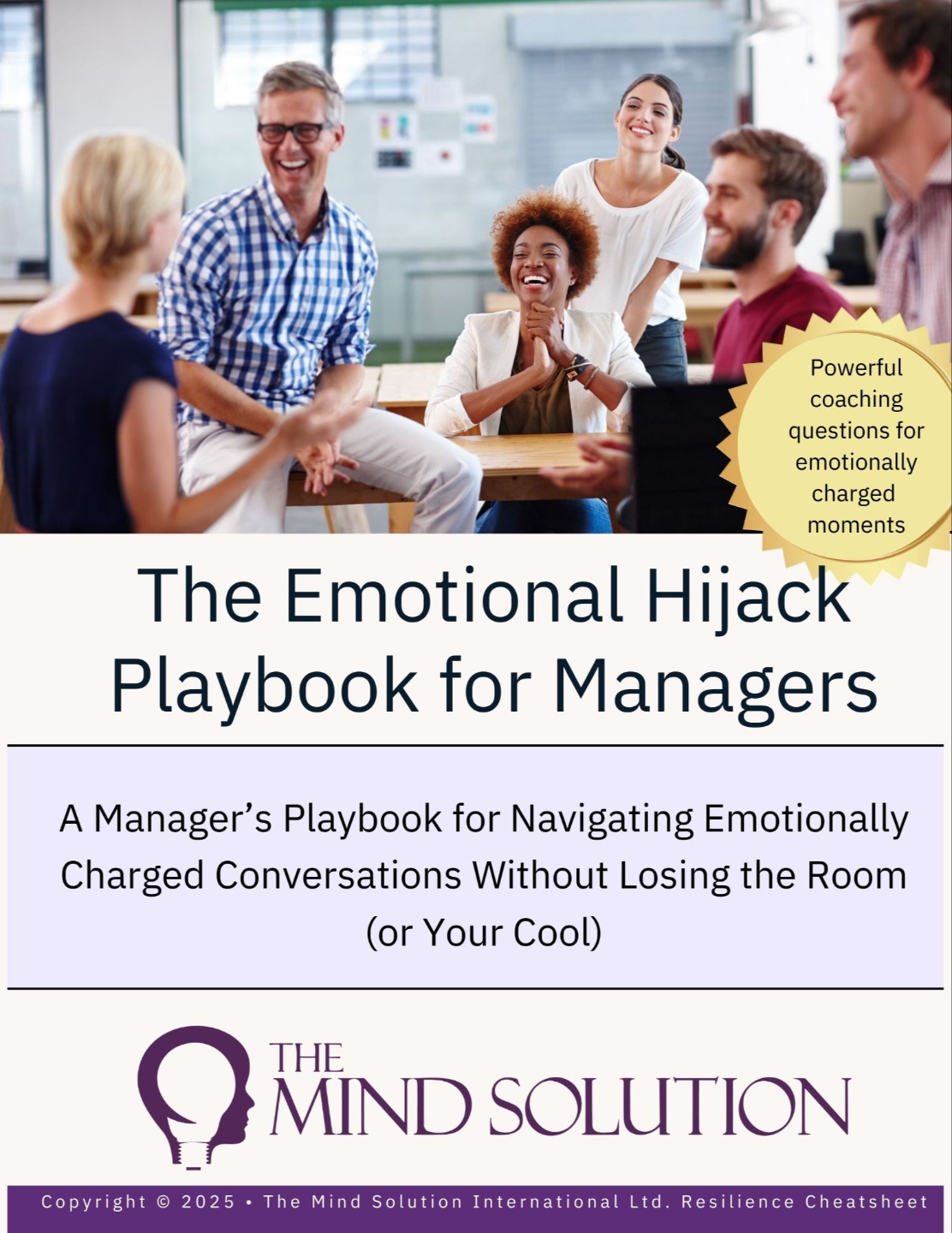From Pigeons to Dead Bodies - The Epidemic of HR Burnout!
Jun 12, 2025
Working in Human Resources isn't just about policies and procedures—it's about navigating the most challenging, unexpected, and emotionally demanding situations an organisation can throw at you.
From disciplinary hearings involving pigeons (you're going to have to watch the video now!) to tragedy and trauma, HR professionals face scenarios that would leave most other departments speechless.
This is exactly why HR stress management training and HR Burnout Training have become essential tools for HR success - and sanity!.
The Reality of HR: Beyond the Textbook
When I was 27, serving as the HR manager of a five-star hotel in Brighton, I thought my HR degree had prepared me for anything. I was wrong. Nothing could have prepared me for holding multiple disciplinary hearings—about a pigeon - now you are really are going to have to watch the video to hear the story to this!
Traditional training doesn't prepare you for the absurd, the tragic, or the unexpectedly human moments that define HR work.
When HR Becomes a Crime Scene: The Importance of Understanding HR Burnout.
After leaving the hotel, I joined a major NHS Trust, where my first case involved a staff member who arrived at work with his deceased girlfriend in the boot of his car......fair to say my HR degree didn't prepare me for this case!
This experience highlighted a critical gap in HR management training: How do we prepare HR professionals for workplace trauma? These situations demand more than policy knowledge—they require exceptional emotional intelligence, crisis management skills, and the ability to remain regulated under extreme pressure.
The Emotional Toll of HR: Why HR Burnout is becoming an epidemic.
Later in my career, while leading a redundancy and restructuring programme for a public sector organisation, I encountered another defining moment. During a redundancy meeting, I had to deliver the devastating news to an employee that she was being made redundant. She broke down, sharing that she and her husband had just secured a mortgage on their new home. The raw emotion was completely natural and understandable.
But here's where it gets telling: her manager, who should have been providing support, simply got up and left the room, abandoning both the employee and me to handle this deeply human moment alone.
If you're an HR professional reading this and these scenarios resonate with you, it's no wonder that HR teams experience emotional exhaustion at alarming rates. Wellbeing in the workplace must start with the very people responsible for everyone else's wellbeing—the HR team.
Why Traditional Resilience Training Falls Short
Over my 12-year HR career, despite having a university degree in HR and completing my CIPD qualification, nothing truly prepared me for the psychological and emotional demands of the role. We deal with situations that simply don't exist in other areas like sales and marketing!
This realisation led me to spend the next 12 years working one-on-one with people as both a coach and therapist, while delivering mental health training for managers to organisations. Through this work, I recognised that my "old tribe"—HR professionals—needed specialised support more than anyone else.
Traditional resilience training isn't enough. Emotional intelligence training for leaders and HR stress management needs to go deeper, addressing the unique challenges HR professionals face daily.
Introducing HR Alchemy: Beyond Traditional HR Burnout Training
This insight led to the creation of HR Alchemy, a signature two-day programme specifically designed for HR professionals and teams. This isn't your typical emotional intelligence workshop or generic HR stress management training. HR Alchemy is built around nervous system regulation, teaching HR professionals how to show up in their roles from a place of groundedness and stability.
Why Nervous System Regulation Matters in HR
The nature of HR work directly impacts our nervous system. When we're dealing with disciplinary hearings, workplace trauma, redundancies, and crisis situations, our bodies respond with stress responses that can become chronic if not properly managed. Traditional emotional intelligence training often focuses on understanding emotions but doesn't address the physiological impact of constant exposure to workplace stress and trauma.
HR Alchemy addresses this gap by teaching:
- Advanced Emotional Intelligence: Going beyond basic EQ to develop sophisticated emotional regulation skills
- Nervous System Regulation Techniques: Practical tools for maintaining physiological balance during high-stress situations
- Trauma-Informed HR Practices: How to handle workplace trauma while protecting your own mental health
- Leadership Presence Under Pressure: Maintaining authority and compassion simultaneously
- Sustainable Decision-Making: Making sound judgments even when emotionally activated
The Business Case for Specialised HR Training
Organisations investing in HR leadership development programs and emotional intelligence training for managers within their HR teams see measurable returns:
Reduced Turnover
HR departments experience significantly lower turnover rates, saving organisations the substantial costs of recruiting and training new HR professionals (and the recruitment fees of replacing a new HR senior team member!).
Improved Employee Relations
HR professionals with advanced emotional intelligence training handle sensitive situations more effectively, leading to better outcomes for all parties involved and reduced legal risks.
Enhanced Organisational Culture
When HR teams are operating from a regulated, grounded state, they create ripple effects throughout the organisation, improving overall wellbeing in the workplace.
Crisis Management Excellence
Organisations with trauma-informed HR teams are better equipped to handle unexpected crises, from workplace accidents to personal tragedies affecting staff.
Beyond Burnout: Creating Sustainable HR Careers
The traditional approach to HR management training focuses on policies, procedures, and legal compliance. While these elements remain important, they're insufficient for the modern HR professional who must navigate increasingly complex human dynamics.
Leadership and emotional intelligence training specifically designed for HR professionals addresses:
Emotional Labour Management
HR work involves significant emotional labour—managing not just your own emotions but helping others process theirs. This requires specialised emotional intelligence training that acknowledges the unique demands of the role.
Boundary Setting in High-Stakes Situations
Learning to maintain professional boundaries while showing genuine empathy is a sophisticated skill that requires practice and proper training.
Decision-Making Under Emotional Pressure
Unlike other departments, HR professionals must often make critical decisions while managing intense emotions—both their own and others'. This requires advanced emotional regulation skills.
The Ripple Effect: How Regulated HR Teams Transform Organisations
When HR professionals receive proper emotional intelligence training for leaders, the benefits extend far beyond the HR department:
Improved Conflict Resolution
HR teams with advanced emotional intelligence skills resolve conflicts more effectively, creating safer, more productive work environments.
Enhanced Employee Trust
Employees are more likely to approach HR with concerns when they perceive HR professionals as emotionally intelligent and genuinely supportive.
Reduced Workplace Drama
Well-trained HR teams can identify and address interpersonal issues before they escalate into major problems.
Better Change Management
Organisations undergoing transitions benefit enormously from HR teams trained in emotional intelligence and stress management.
Moving Forward: The Future of HR Professional Development
The stories I've shared—from pigeon-related disciplinary hearings to workplace tragedies—illustrate why HR professionals need specialised support. We can't continue expecting HR teams to handle the most emotionally demanding situations in organisations without providing them with appropriate tools and training.
Wellbeing in the workplace initiatives must include comprehensive support for HR teams. This means moving beyond traditional emotional intelligence workshops to provide deep, practical training in nervous system regulation, trauma-informed practices, and sustainable emotional labour management.
Conclusion: From Burnout to Brilliance
HR professionals deserve to thrive, not just survive. With HR Alchemy HR teams can move from burnout back to brilliance—and stay there.
HR Alchemy represents a new approach to HR leadership development programs, one that recognises the unique demands of HR work and provides practical solutions for sustainable success. Because when HR professionals are operating from a place of nervous system regulation and emotional intelligence, everyone in the organisation benefits.
The Emotional Hijack Playbook For Managers
A Manager’s Free Resource for Navigating Emotionally Charged Conversations Without Losing the Room (or Your Cool).
Perfect to use in your next one-to-one.







